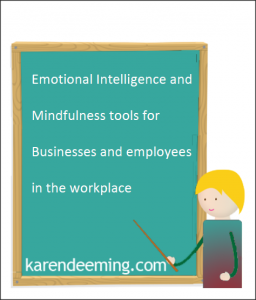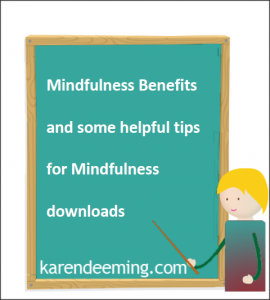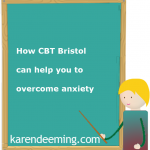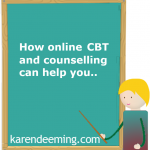In response to Coronavirus (Covid-19), I am offering telephone, online counselling and CBT sessions via Zoom and WhatsApp.
Aren’t Januarys tough sometimes? what with post Christmas blues and cold dark nights?
Back by popular demand, this video I created for my coaching business, You Revolution, shows how mindfulness can help you with Blue Monday. Mindfulness can also help you to reduce and overcome anger outbursts, stress, panic attacks, anxiety, depression, negative thinking patterns, high blood pressure, low self esteem and exhaustion.
Feeling low or depressed because of dark nights and too much rainfall?
Dreading the arrival of your credit card bill this month?
Want to simply curl up in bed beneath your duvet and hibernate for the whole of January?
Feeling disappointed that your New Year Resolution, detox or weight loss programmes aren’t going as well as you had anticipated?
Then you may have fallen victim to Blue Monday trap. Following extensive research findings, the third Monday of January, supposedly the most depressing day of the year, has been awarded the gloomy title due to a combination of post-Christmas blues, cold dark nights and the arrival of unpaid credit card bills.
Even though I, Karen Deeming, am doing my dream job, Blue Monday is still always tough, however, what helps me cheer myself up and get through the day is my daily mindfulness practice, doing nice things for other people or simply remembering that I have roof over my head, have the pleasure of three good meals a day and I don’t have the misfortune of living in a war zone.
Mindfulness is a technique for reducing stress, exhaustion, high blood pressure, panics, anxiety, and negative thinking patterns which has been widely approved by the international medical community. It teaches greater awareness of our thoughts, feelings and sensations through simple techniques like visualization, meditation and gentle movement.
Let me give you a recent, real life example of how mindfulness helps:
Despite a prediction of heavy rain in Somerset a few days ago, I decided to take out my rickety vintage bicycle “Flo” for an impromptu cycle ride to the local farm shop. As she had been snuggling up to the lawn mower for most of December it was no easy task to take Flo out of the shed, nonetheless I still proceeded to do so.
The cycle route from Pilton to Pylle is no stranger to me but today it was a strikingly different experience because I had decided to attempt mindful cycling. In other words, I adopted a small steps approach, focusing on the here and now and the journey rather than a speedy arrival at my destination.
How stunning I chuckled to myself as I was greeted by the distant view of Glastonbury Tor. I even encountered the delightful sound of a trickling stream for the first time too. Slightly distracted by these delicious in the moment experiences, I cycled through an unexpected knee deep, muddy puddle resulting in a near trench foot endangerment.
Fortunately, I escaped lightly and though my socks were thoroughly soaked, a brief recollection of a relentless flooded tent experience at the Glastonbury Festival in 1996 encouraged me to soldier on. What also helped me manage this somewhat unattractive incident, were the charming duo of immaculate cocker spaniels grinning at me from the rear window of a delapidated jeep ahead. Ten minutes or so later I noticed a distinct change in the earlier calm blissful atmosphere and it suddenly struck me that I had entered into the realms of a busy, treadmill resembling, A road……
Anyway. The reason I’m writing this blog for you is not just to share the awesomeness of Pilton landscape(though it ‘s definitely a worthwhile visit).
It’s also this:
The application of mindfulness together with my conscious intention to zoom in on the abundance of delightful landscape instead of focusing on the scarcity of sunshine resulted in a highly pleasurable experience.
Moreover though it was forecast to train at 11am it didn’t actually rain until 11.10am when I was safely home and dry nestled up to the cat on the kitchen sofa.
Over to you
The ability to achieve a successful work life balance in order to live more creatively and fully has never been more important than in today’s society. Unless you take more quality time on your own, you will always experience emotional and physical difficulties from the beginning of your working life until the grave. Health, well-being and mindfulness workshops are our passion at You Revolution that’s why we pride ourselves in inspiring people, like you, to find balance in work and play and in your mind and body and to experience being in the flow.
We also provide the ideal playground and tools to empower people, like you, to overcome issues that are bothering you. This includes learning practical skills that you can use in everyday life and learning techniques to identify your triggers and to put a stop to any unhelpful behavioural patterns.
If after reading this blog you are still struggling to motivate yourself on Blue Monday or indeed anytime in 2017, why not take this one small step today by signing up to one of our mindfulness one day or eight week courses where you can meet like minded people and achieve life changing results!!
Alternatively, if you don’t feel ready for a course just yet we also offer on line or face to face counselling sessions too.
Make it happen Stop thinking, Start doing !!!
You can book your appointment here or you can contact me on (044) +7950 751352 for outside the UK or 07950 751352 inside the UK. Alternatively by email: karen@karendeeming.com.





![Karen_Deeminga[1]](http://www.karendeeming.com/wp-content/uploads/2015/09/being-practice-self-portrait-e1541437891746.jpg) Welcome to my site. if you have any queries then please
Welcome to my site. if you have any queries then please

